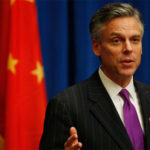 In this multi-polar world we live in, cooperation among the top three world powers (U.S., China, EU – see my previous post on ‘Triangle World Order’) will be paramount in fixing global problems like the global economic recession, climate change, nuclear proliferation, and now the developments in North Africa and the Middle East. Such efforts will get even harder if there is friction among the top three. With the EU facing the greatest internal challenge since its monetary unification, it will be U.S. and China which will define this decade.
In this multi-polar world we live in, cooperation among the top three world powers (U.S., China, EU – see my previous post on ‘Triangle World Order’) will be paramount in fixing global problems like the global economic recession, climate change, nuclear proliferation, and now the developments in North Africa and the Middle East. Such efforts will get even harder if there is friction among the top three. With the EU facing the greatest internal challenge since its monetary unification, it will be U.S. and China which will define this decade.
For all the talk about economic stagnation (U.S.), public debt (EU), food and resource allocation (China), or democratic deficits (Arab Spring), it will ultimately be global trade which will facilitate the much needed economic growth, increase government revenues, and alleviate food shortages around the world. In particular, it will be up to China and the U.S., the two largest economies in the world and top importer-exporters to keep the global economy going. When Niall Ferguson and Moritz Schularick coined the phrase ‘Chimerica’, they were describing the symbiotic relationship between the U.S. and China and the dangers to the global economy if tensions between the two nations escalated to a currency war. Now, this Chimerica could be the driving force behind the global economic recovery!
Next year (2012) will be a significant year politically, for both China and the U.S. For China, barring any unexpected developments, Xi Jinping and Li Keqiang will assume the leadership of the country the party and the government next year. Such transitions are usually followed by a period of internal and external tensions, as the new leadership is emerging under the shadow of the previous generation and is trying to assert itself both domestically and internationally. The underlying question therefore is ‘will the domestic and foreign policies of Xi and Li differ from current policies’?
On the other side of the Pacific, the U.S. will be holding presidential election in 2012. Barack Obama, who inherited the housing bubble which caused the global economic recession, not to mention two wars, the Arab Spring, and two environmental disasters, has not done a good job of either appreciating the importance of the U.S.-China symbiotic relationship or managing the impact of Chimerica on the global economy. He spend his first two years pushing through Congress a stimulus plan and an expansive healthcare law, only to see the nation turn against his policies and elect a Congress bent on reversing his domestic policies and drastically reduce the size of the U.S. government.
Reversing the global economic recession and tackling political unrest around the world will require enhanced cooperation between the U.S. and China, and visionary leaders at the helm. But most importantly, a U.S. president who would know how to handle the new Chinese leaders and would truly appreciate the dangers and opportunities present in this symbiotic relationship. President Obama has not demonstrated that he is that man, while Jon Huntsman, former U.S. ambassador to China and possible presidential candidate for the Republican Party, could just be the perfect man for the job.
Starting in 2012, the U.S. government will have to embark on an aggressive and persistent cooperation with and courting of the new Chinese leadership in Beijing. Leadership at a global stage will still be the U.S.’s responsibility, as developing China will always put its national interests above those of the global good. In climate change, nuclear proliferation, North Korea and Iran, the Arab Spring, global trade, the European debt crisis and the (very important) survival of the Euro, and now Pakistan, the U.S. will need China’s support, acquiescence and participation in any global or regional efforts to address these issues.
Starting in 2012, the U.S. president will have to be without a doubt, a China expert! The U.S. president will not only have to understand domestic developments in China (see: Socialism 3.0 in China) but also address domestic U.S. concerns about China (see: GOP sees red over China). The next U.S. president will have to know how China truly works in order to convince Beijing to adopt more carbon reducing policies, expand domestic consumption, appreciate the RMB, better protect foreign intellectual property, and expand civil and political freedoms. Conversely, the next U.S. president will have to change American attitudes towards China (a plurality considers China the greatest international threat to the U.S.), impose discipline to the federal budget, reduce the national debt, and re-engage the global community with respect to some of our most pressing global problems.
Cultural, linguistic, and political differences can stand in the way of turning an often tense U.S.-China relationship to the true engine of both economic growth and global cooperation. Jon Huntsman, with his intimate knowledge of China’s cultural and political idiosyncrasies, would be the best man to lead Chimerica for the next decade.